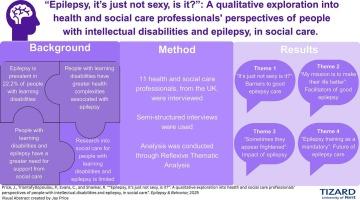“Epilepsy, it’s just not sexy, is it?”: A qualitative exploration into health and social care professionals’ perspectives of people with intellectual disabilities and epilepsy, in social care
IF 2.3
3区 医学
Q2 BEHAVIORAL SCIENCES
引用次数: 0
Abstract
Background
Epilepsy is prevalent in 22.2% of the intellectual disability (ID) population, with complexities spanning across health and social care sectors. Minimal research has been conducted to explore the experiences of epilepsy care within social care, despite its significance.
Methodology
Qualitative methodologies, using semi-structured interviews, were used to explore the experiences of health and social care professionals within the United Kingdom and analysed using Braun and Clarke’s reflexive thematic analysis framework.
Results
Four overarching themes were constructed from 11 interviews a) “It’s just not sexy, is it?”: Barriers to good epilepsy care, b) “My mission is to make their life better”: Facilitators of good epilepsy care, c) “Sometimes they appear frightened”: Impact of epilepsy, d) “Epilepsy training as a mandatory”: Future of epilepsy care. Fear was the most prevalent emotion described by participants throughout, which was perpetuated by the lack of resources and understanding/awareness, such as training. However, facilitating better epilepsy care for people with ID, can help reduce fear, and promote better wellbeing in all. Participants made recommendations such as mandating epilepsy training, and involving all key stakeholders, including families of people with ID, to improve epilepsy care in the future.
Conclusion
Mandating epilepsy training in health and social care settings is beneficial for care delivery and reducing the impact of epilepsy upon families and caregivers. Involving key stakeholders, such as families and caregivers, in all aspects of epilepsy care for people with ID, improves communication, service delivery and quality.

“癫痫,就是不性感,对吧?”":对卫生和社会护理专业人员在社会护理中对智力残疾和癫痫患者的看法进行定性探索
癫痫症在22.2%的智力残疾人群中普遍存在,其复杂性跨越了卫生和社会保健部门。尽管社会护理具有重要意义,但探索癫痫护理经验的研究很少。方法使用半结构化访谈的定性方法来探索联合王国境内卫生和社会护理专业人员的经验,并使用Braun和Clarke的反身性主题分析框架进行分析。结果从11个访谈中构建了四个主要主题:a)“它就是不性感,是吗?:良好癫痫治疗的障碍,b)“我的使命是让他们的生活更美好”,良好癫痫治疗的推动者,c)“有时他们看起来很害怕”,癫痫的影响,d)“癫痫培训是强制性的”,癫痫治疗的未来。恐惧是参与者描述的最普遍的情绪,这种情绪是由于缺乏资源和理解/意识(如培训)而持续存在的。然而,为ID患者提供更好的癫痫护理可以帮助减少恐惧,并促进所有人的福祉。与会者提出了一些建议,例如要求开展癫痫培训,并让所有主要利益攸关方(包括癫痫患者的家庭)参与进来,以改善未来的癫痫护理。结论在卫生和社会保健机构强制实施癫痫培训有利于服务提供,减少癫痫对家庭和照顾者的影响。让家庭和照护者等关键利益攸关方参与ID患者癫痫照护的各个方面,可改善沟通、服务提供和质量。
本文章由计算机程序翻译,如有差异,请以英文原文为准。
求助全文
约1分钟内获得全文
求助全文
来源期刊

Epilepsy & Behavior
医学-行为科学
CiteScore
5.40
自引率
15.40%
发文量
385
审稿时长
43 days
期刊介绍:
Epilepsy & Behavior is the fastest-growing international journal uniquely devoted to the rapid dissemination of the most current information available on the behavioral aspects of seizures and epilepsy.
Epilepsy & Behavior presents original peer-reviewed articles based on laboratory and clinical research. Topics are drawn from a variety of fields, including clinical neurology, neurosurgery, neuropsychiatry, neuropsychology, neurophysiology, neuropharmacology, and neuroimaging.
From September 2012 Epilepsy & Behavior stopped accepting Case Reports for publication in the journal. From this date authors who submit to Epilepsy & Behavior will be offered a transfer or asked to resubmit their Case Reports to its new sister journal, Epilepsy & Behavior Case Reports.
 求助内容:
求助内容: 应助结果提醒方式:
应助结果提醒方式:


